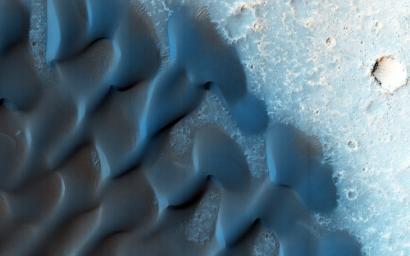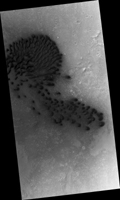
|
The Changing Sands
- Click the image above for a larger view
- Full-Res JPEG (2880 x 1800) (771.5 kB)
- Full-Res TIFF (2880 x 1800) (15.6 MB)
Caption:

Map Projected Browse Image
Click on the image for larger version
As of this date, MRO has been orbiting Mars for nine years. One benefit of MRO's nearly three completed extended missions is the chance to see landscapes change over time.
These barchan sand dunes are a case in point: these have been imaged at least five times already, and each time, a bit more movement is revealed.
The steeply-dipping slip faces (where sand slides down after it gets piled up on the dunes' crests) indicate the direction of the wind, although this particular dune field seems to show *two* converging wind directions .
Background Info:
The University of Arizona, Tucson, operates HiRISE, which was built by Ball Aerospace & Technologies Corp., Boulder, Colo. NASA's Jet Propulsion Laboratory, a division of the California Institute of Technology in Pasadena, manages the Mars Reconnaissance Orbiter Project for NASA's Science Mission Directorate, Washington.
Cataloging Keywords:
| Name | Value | Additional Values |
|---|---|---|
| Target | Mars | |
| System | ||
| Target Type | Planet | |
| Mission | Mars Reconnaissance Orbiter (MRO) | |
| Instrument Host | Mars Reconnaissance Orbiter | |
| Host Type | Orbiter | |
| Instrument | High Resolution Imaging Science Experiment (HiRISE) | |
| Detector | ||
| Extra Keywords | Color, Dune, Map | |
| Acquisition Date | ||
| Release Date | 2016-01-27 | |
| Date in Caption | ||
| Image Credit | NASA/JPL-Caltech/Univ. of Arizona | |
| Source | photojournal.jpl.nasa.gov/catalog/PIA20369 | |
| Identifier | PIA20369 | |
